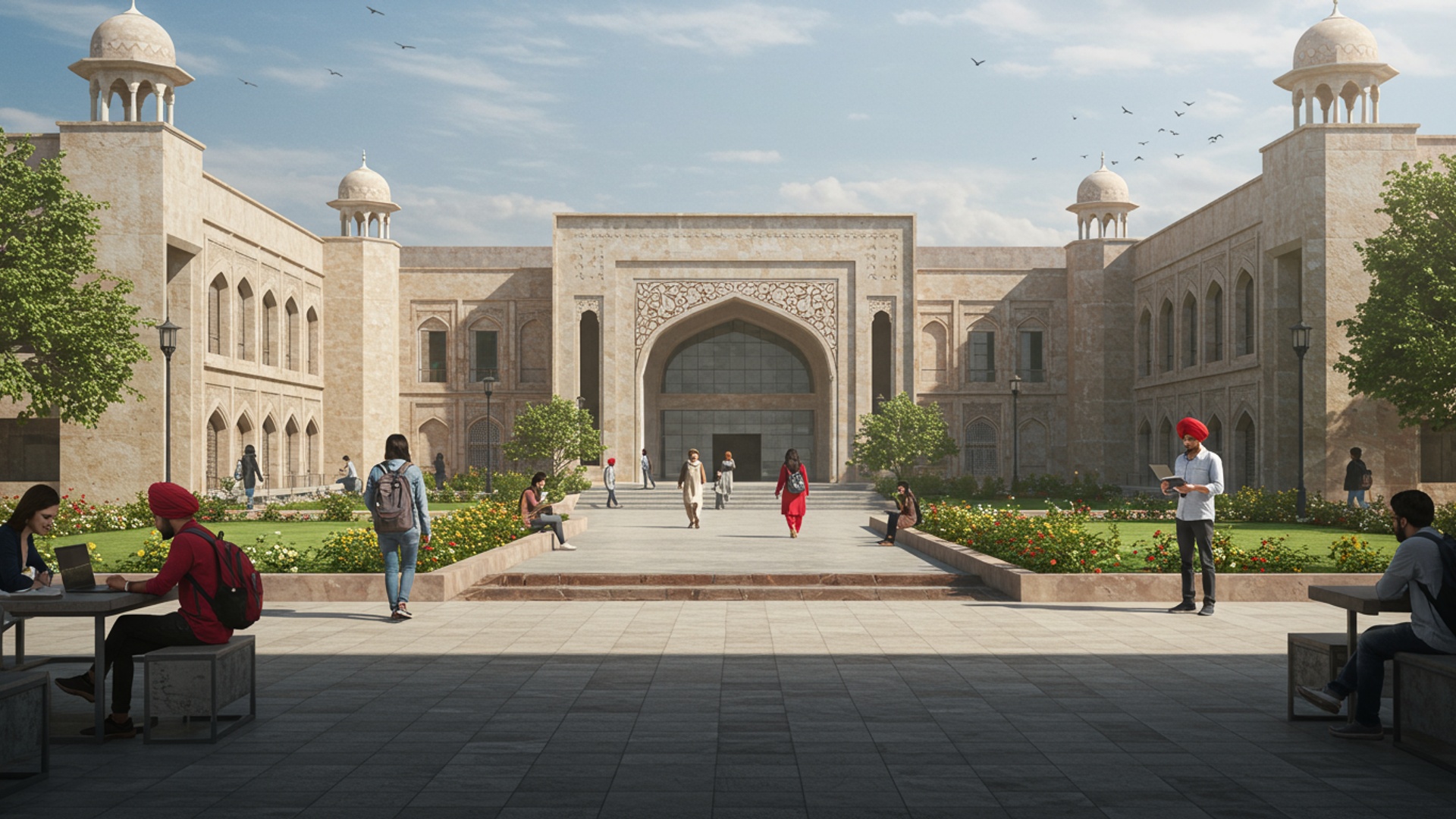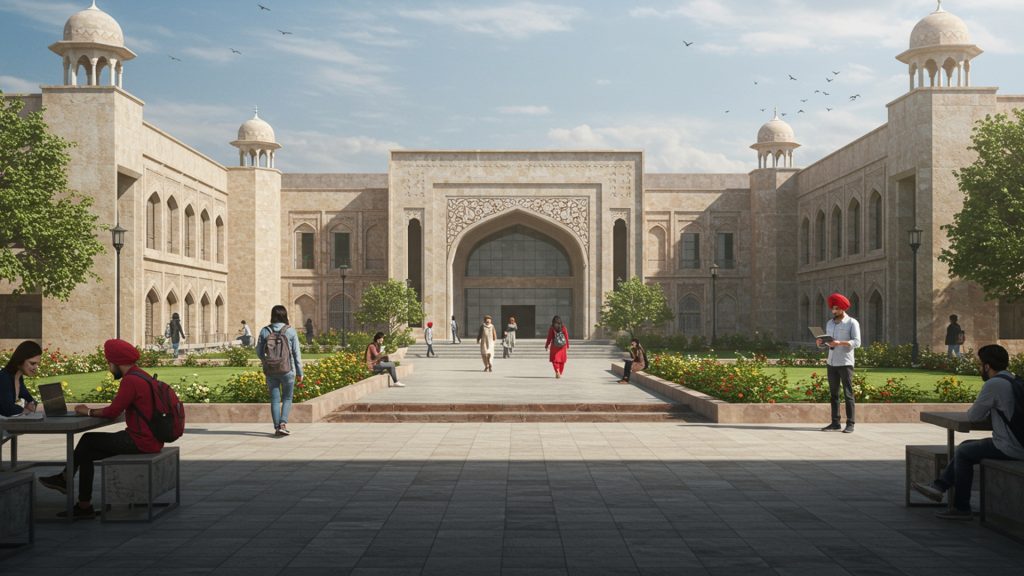The pursuit of higher education in Punjab presents a dynamic landscape, where institutions increasingly blend traditional academic rigor with cutting-edge innovation. Aspiring students navigating this critical decision face a plethora of choices, each promising a unique trajectory. Identifying a truly top university in Punjab now extends beyond historical reputation, encompassing factors like robust industry-academia collaborations, advanced research infrastructure in fields such as AI and sustainable agriculture. a strong emphasis on global accreditations. Recent developments, including significant investments in skill-based learning centers and a focus on interdisciplinary programs, redefine what constitutes excellence, preparing graduates for an evolving global economy. The challenge lies in discerning which institutions genuinely offer the foundational and forward-thinking education crucial for future success.

Navigating the Educational Landscape: What Makes a University Stand Out?
Embarking on your higher education journey is an exhilarating time, filled with choices that will shape your future. Punjab, a vibrant state known for its rich cultural heritage and dynamic economy, has emerged as a formidable hub for quality education. But with so many institutions vying for your attention, how do you truly identify the top university in Punjab that aligns perfectly with your aspirations? It’s more than just a name; it’s about a holistic ecosystem designed for student success. Let’s delve into the crucial factors that define excellence in higher education.
Understanding what makes a university truly exceptional requires looking beyond surface-level appeal. It involves a deep dive into several interconnected elements:
- Accreditation and Recognition
- National Rankings (NIRF)
- Faculty Expertise and Student-to-Faculty Ratio
- Infrastructure and Facilities
- Research and Innovation Ecosystem
- Placement and Career Support
- Alumni Network
This is foundational. Look for universities accredited by bodies like the National Assessment and Accreditation Council (NAAC) with high grades (A++, A+). NAAC evaluates institutions on various parameters including curriculum, teaching-learning, research, infrastructure. student support. Similarly, recognition by the University Grants Commission (UGC) is paramount for degree validity.
The National Institutional Ranking Framework (NIRF), introduced by the Ministry of Education, Government of India, offers a transparent and objective evaluation of Indian higher education institutions across various categories like Overall, Universities, Engineering, Management, Pharmacy, etc. A consistently high NIRF ranking is a strong indicator of a top university in Punjab.
Exceptional faculty members are the backbone of any great institution. Look for professors with strong academic backgrounds, research publications, industry experience. a passion for teaching. A healthy student-to-faculty ratio ensures personalized attention and effective mentorship.
State-of-the-art laboratories, well-stocked libraries (both physical and digital), modern classrooms, robust IT infrastructure, comfortable hostels. excellent sports facilities all contribute to a conducive learning environment.
A vibrant research culture, evident through funded projects, publications, patents. collaborations with industry or international universities, signifies an institution’s commitment to advancing knowledge and offering cutting-edge education.
Strong industry connections, dedicated placement cells, career counseling, skill development workshops. a high percentage of successful placements are vital. This demonstrates the university’s ability to prepare students for the professional world.
A strong and engaged alumni network can open doors to mentorship, internships. career opportunities, providing invaluable support even after graduation.
Exploring the Diverse Landscape of Universities in Punjab
Punjab offers a rich tapestry of higher education institutions, each with its unique strengths and focus. Understanding the different types can help you narrow down your search for the ideal top university in Punjab.
Here’s a comparison of common university types you’ll encounter:
| Feature | Government/State University | Private University | Deemed-to-be University |
|---|---|---|---|
| Governance | Established by state acts, funded by state/central government. | Established by societies/trusts, self-financed. | Institutions declared “Deemed to be University” by the Central Government on UGC’s advice. |
| Fee Structure | Generally lower fees, often subsidized. | Higher fees, as they are self-financed. | Fees can vary, often comparable to private universities. |
| Curriculum Flexibility | Traditionally more standardized. evolving. | Often more flexible and industry-oriented, quicker to update. | High autonomy in designing courses and curriculum. |
| Focus Areas | Broad range of disciplines, often strong in traditional arts, sciences. engineering. | Can specialize in specific fields like engineering, management, design, or health sciences. | Often started with a strong reputation in a niche area before gaining deemed status. |
| Admission Process | Often through state-level entrance exams or merit-based. | May have their own entrance exams, direct admissions, or consider national-level scores. | Their own entrance exams or merit-based. |
Beyond these categories, you’ll find specialized institutions focusing on agriculture (e. g. , Punjab Agricultural University), health sciences, engineering. management, each renowned in its respective domain. For instance, institutions like IIT Ropar (though central, it’s a premier institution in Punjab), Panjab University, Thapar Institute of Engineering & Technology, Lovely Professional University. Chitkara University are frequently mentioned in discussions about the top university in Punjab, each excelling in distinct areas.
Unlocking Your Potential: Real-World Applications and Success Stories
Choosing a university is not just about gaining a degree; it’s about transforming knowledge into tangible skills and opportunities. A truly inspiring university experience leads to real-world applications and prepares you for a thriving career. Let’s consider some use cases of what a quality education from a top university in Punjab can lead to.
- Innovation and Entrepreneurship
- Global Careers
- Research and Development
- Community Impact
Many universities in Punjab now boast robust incubation centers and entrepreneurship cells. Imagine a student, let’s call her Priya, from an engineering program. Her university’s incubation center provided mentorship, seed funding. access to a network of investors, allowing her to launch a successful Agri-tech startup that helps local farmers optimize crop yields using AI. This direct application of her learning is a testament to the university’s supportive ecosystem.
Graduates from top institutions in Punjab are increasingly finding opportunities on the global stage. Take Rohan, who studied business administration. His university’s strong international exchange programs and emphasis on global business case studies prepared him for a role in a multinational corporation’s Dubai office, handling international logistics.
For those passionate about pushing the boundaries of knowledge, a research-focused university is key. Dr. Ananya, a medical graduate, pursued her Masters and Ph. D. at a university known for its cutting-edge health sciences research. Her work on developing new diagnostic tools for chronic diseases is now being recognized nationally, a direct outcome of the advanced research facilities and expert guidance she received.
Beyond corporate success, many graduates are making significant social impact. A social work graduate, for example, might apply their understanding of community development and policy to establish an NGO addressing rural education gaps in Punjab, leveraging the practical field experience gained during their studies.
These stories highlight that the best universities don’t just teach; they empower, connect. inspire students to make a difference, whether in technology, business, healthcare, or social welfare.
Your Strategic Guide to University Selection and Application
Now that you comprehend what to look for, let’s craft a strategic approach to selecting and applying to the top university in Punjab for you. This isn’t a one-size-fits-all process; it requires introspection, research. meticulous planning.
Step-by-Step Selection Process:
- Self-Assessment
- What are your career aspirations?
- Which subjects genuinely excite you?
- What kind of learning environment do you thrive in (large campus vs. small, research-intensive vs. industry-focused)?
- What is your budget for tuition and living expenses?
- Thorough Research
- Utilize official websites: UGC, AICTE, NIRF rankings.
- Explore university websites: Look for faculty profiles, course curricula, research projects, placement records. student testimonials.
- Attend virtual or in-person open days: This gives you a feel for the campus culture and allows you to interact with faculty and students.
- Read independent reviews and news articles about the institutions.
- Program-Specific Deep Dive
- Even within a top university in Punjab, not all programs are equally strong. Research the specific department or program you’re interested in.
- Look at the faculty specialized in your chosen area, the lab facilities. the program’s specific industry collaborations.
- Connect with Current Students/Alumni
- Leverage platforms like LinkedIn or university-specific forums. Their first-hand experiences can offer invaluable insights.
Mastering the Application Process:
The application journey can seem daunting. breaking it down makes it manageable. Here’s a conceptual checklist, often followed by institutions:
// University Application Checklist (Conceptual) 1. Research Admission Requirements: - Check eligibility criteria (e. g. , minimum percentage in 10+2). - Identify required entrance exams (e. g. , JEE Main, NEET, university-specific tests). - Note application deadlines. 2. Prepare Necessary Documents: - Academic transcripts (10th, 12th grade mark sheets). - Entrance exam scorecards. - Character certificate, migration certificate. - Passport-sized photographs. - Proof of identity and address. - Category certificates (if applicable, e. g. , SC/ST/OBC). 3. Fill Out Application Form: - Be meticulous and accurate. - Double-check all entered insights. 4. Write a Compelling Statement of Purpose (SOP) / Essay: - Articulate your motivations, career goals. why you chose this specific university and program. - Highlight relevant experiences, projects, or extracurricular activities. 5. Secure Letters of Recommendation (LORs) if required: - Choose teachers or mentors who know you well and can speak to your strengths. - Provide them with ample time and necessary details. 6. Prepare for Entrance Exams / Interviews: - Practice previous year papers. - Stay updated on current affairs (for general awareness tests). - Rehearse common interview questions. 7. Submit Application and Pay Fees: - Ensure all components are submitted before the deadline. - Keep payment receipts and application confirmation. 8. Track Application Status: - Regularly check the university's admission portal or your email for updates. Remember, a well-researched decision coupled with a carefully prepared application significantly boosts your chances of securing a spot at your desired top university in Punjab. This is your future; invest the time and effort wisely!
Conclusion
Your journey to finding the ideal university in Punjab culminates not just in selecting a name. in aligning your aspirations with a nurturing environment. Remember, the best university isn’t always the highest ranked; it’s the one that best fits you. Take the example of Lovely Professional University’s strong industry ties, or Chandigarh University’s innovation focus – these distinct strengths cater to diverse student profiles. My personal tip? Beyond brochures, engage with alumni on LinkedIn; their unfiltered experiences offer invaluable insights into campus culture and career prospects. In today’s dynamic landscape, consider how a university prepares you for evolving job markets. Look for programs with strong practical components, like Thapar Institute’s emphasis on research or Punjab Agricultural University’s groundbreaking work in sustainable farming. This proactive approach, coupled with current trends in skill-based education, ensures your degree holds lasting value. Don’t merely choose; actively investigate. Your future in Punjab’s vibrant academic scene is yours to shape, so step forward with informed confidence. For broader insights into global university selection criteria and program comparisons, consult resources like Top Universities.
More Articles
Boost Your SAT Score: Proven Study Techniques to Unlock Top College Admissions in 2025
How a National University Degree Can Boost Your Career in 2025: A Practical Guide
Navigating Your MBA Journey: Practical Steps to Choose the Perfect Program for 2025
Navigating Business Analytics Careers: Discover In-Demand Roles and Essential Skills for 2025
Discover the Best Universities in MP for Your Future: A Comprehensive Guide
FAQs
What should I look for when trying to find the best university in Punjab?
Focus on key factors like a university’s academic reputation, the variety and relevance of programs offered, the experience of the faculty, available infrastructure (like labs and libraries), placement records. the overall campus culture. It’s also smart to check student-teacher ratios and any research opportunities they provide.
Can you name a few top universities in Punjab that are often highly rated?
Absolutely! Some highly regarded institutions often include Panjab University, Punjabi University Patiala, Guru Nanak Dev University Amritsar. Lovely Professional University. Each has its unique strengths and focus areas, so it’s worth diving deeper into what each offers.
How do I know which university is the ‘right fit’ for my future goals?
Start by clearly defining your academic interests and what you hope to achieve career-wise. Then, research universities that really shine in those specific fields. Consider the campus vibe, location, the cost of attendance. any extracurricular activities that matter to you. Visiting campuses or attending virtual open days can give you a much better feel for the environment.
Is it vital to consider things other than just academic rankings?
Definitely! While academics are super vital, also think about student support services, hostel facilities, sports and cultural activities. the overall student community. A truly great university experience involves more than just classroom learning; it’s about holistic development.
When should I start planning my university applications in Punjab?
It’s always a good idea to start early, ideally about a year before you plan to enroll. This gives you plenty of time to research different programs, prepare for any entrance exams, gather all necessary documents. meet those varying application deadlines that different institutions might have.
What about the cost of studying at these universities?
Tuition fees can vary quite a bit, depending on whether you choose a government-funded or a private university. Government universities typically have lower fees. private ones might offer more specialized programs or state-of-the-art facilities. Don’t forget to factor in living expenses, accommodation. keep an eye out for scholarship opportunities!
Are there particular universities known for specific types of courses, like engineering or arts?
Yes, many universities have their specializations. For example, Panjab University is renowned for its strong science and arts programs, while institutions like Lovely Professional University are often sought after for engineering, technology. management courses. Always check the specific department’s reputation and faculty expertise for your chosen field.



